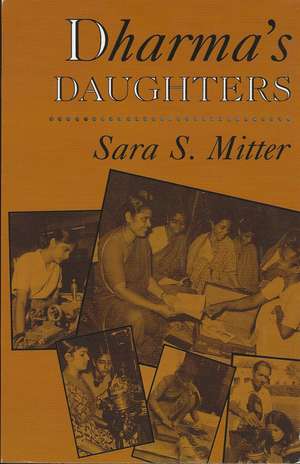Dharma's Daughters: Contemporary Indian Women and Hindu Culture
Autor Sara S Mitteren Limba Engleză Paperback – sep 1991
Women in India today are faced with a major conflict: how to adjust to rapid modernization and industrialization without abandoning traditional roles and customs. One of the assets of Hinduism has been its ability to incorporate seemingly unorthodox ideas, not fight against them. Contemporary Indian women today are trying to reconcile innovation with tradition as they assert that women are significant participants in the economy, that crimes against women should be investigated and prosecuted, and that a woman can divorce her husband. This is no easy task in light of the highly structured nature of Indian society. It is both hierarchical and patriarchal. Regardless of a family's economic position, women in the family are considered inferior. It is the woman's job, first and foremost, to be loyal to her husband and to be a good mother to her children.
Dharma's Daughters is divided into three sections. The first introduces us to women who live and work in Bombay, where the population is dense and the housing is inadequate. We meet manual laborers, members of construction crews, and illiterate domestic workers who live in shanties. Mitter paints a vivid picture of the harried lives of these women. In the second section Mitter describes Hindu mythology and the traditions that form the basis for women's lives. In the final section, Mitter tells of the increasing mobilization and resistance of Indian women since the 1970s.
Dharma's Daughters is divided into three sections. The first introduces us to women who live and work in Bombay, where the population is dense and the housing is inadequate. We meet manual laborers, members of construction crews, and illiterate domestic workers who live in shanties. Mitter paints a vivid picture of the harried lives of these women. In the second section Mitter describes Hindu mythology and the traditions that form the basis for women's lives. In the final section, Mitter tells of the increasing mobilization and resistance of Indian women since the 1970s.
Preț: 256.75 lei
Nou
Puncte Express: 385
Preț estimativ în valută:
49.13€ • 51.43$ • 40.65£
49.13€ • 51.43$ • 40.65£
Carte tipărită la comandă
Livrare economică 07-21 aprilie
Preluare comenzi: 021 569.72.76
Specificații
ISBN-13: 9780813516783
ISBN-10: 0813516781
Pagini: 214
Dimensiuni: 140 x 216 x 14 mm
Greutate: 0.28 kg
Ediția:None
Editura: Rutgers University Press
Colecția Rutgers University Press
ISBN-10: 0813516781
Pagini: 214
Dimensiuni: 140 x 216 x 14 mm
Greutate: 0.28 kg
Ediția:None
Editura: Rutgers University Press
Colecția Rutgers University Press
Notă biografică
SARA S. MITTER is a journalist. Married to an Indian physicist, she has made many visits to India.
Cuprins
Preface
Introduction
Part One
1. The Dance of Mayuri
2. The Women's Compartment
3. The Hazards of Homemaking
4. Cleaners and Handicrafters
5. Fetchers and Carriers
6. Ingredients of Everyday Life
Part Two
7. Female Prowess: Shakti
8. Female Propriety: Streedharma
9. The Epic Wife
10. Power and Containment
11. Only a Female
Part Three
12. To Change Your Own Life
13. The Collective Venture
14. Careless Daughters
15. A Four-Thousand-Year-Old History
Coda
Notes
Bibliography
Index
Introduction
Part One
1. The Dance of Mayuri
2. The Women's Compartment
3. The Hazards of Homemaking
4. Cleaners and Handicrafters
5. Fetchers and Carriers
6. Ingredients of Everyday Life
Part Two
7. Female Prowess: Shakti
8. Female Propriety: Streedharma
9. The Epic Wife
10. Power and Containment
11. Only a Female
Part Three
12. To Change Your Own Life
13. The Collective Venture
14. Careless Daughters
15. A Four-Thousand-Year-Old History
Coda
Notes
Bibliography
Index
Descriere
Combining vivid description with thoughtful analysis, Sara Mitter reveals the condititions that shape women's lives in a traditional, patriarchal society. Mitter introduces us to diverse women who live and work in Bombay, from construction crew laborers and illiterate domestic workers who live in shanties, to well-educated, middle-class women. She also confronts the question of gender in Indian society, as she examines the influence of the Goddess mythology and the persistence of such normative models as Sita of the Ramayana in contemporary daily life. In a final section, Mitter tells of the increasing moblilization and resistance of Indian women since the 1970s. She looks at the nature of the conflicts and choices facing Indian women today, and the potential consequences for the India of tomorrow. Sara S. Mitter is an American writer based in Paris. Married to an Indian physicist, she has made many visits to India and has lived there for periods of her life.











